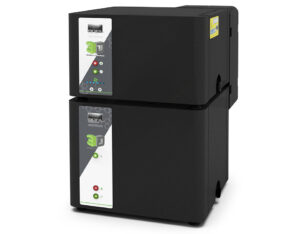
What’s the Difference between 3D Printing and Additive Manufacturing (AM)?
Both are synonyms for the same fundamental process, but increasingly, AM is becoming associated with scaling up for the mass production of products.
There’s less ambiguity when it comes to the hardware – 3D print technology remains the standard term for describing the equipment. Regardless of terminology, the adoption of this manufacturing process is accelerating, driven by a range of important factors.
The Rise of 3D Printing in Manufacturing
Not long ago, manufacturing relied heavily on traditional molding and tooling to produce high volumes of parts. 3D printing was primarily reserved for prototyping or producing bespoke, high-value components in advanced industries like aerospace.
Today, innovations in equipment technology and materials science mean that more manufacturers are looking at the cost breakpoints for mass printing products. This shift isn’t driven by technology alone; supply chain disruptions and delays from overseas suppliers have also accelerated interest in additive manufacturing as a way to secure parts supply and maintain production capabilities.
So, what does this mean for the enabling systems that support this additive manufacturing revolution, notably for the extraction technology that is core to productivity? It is the systems designed and produced by Donaldson BOFA that help maintain both a clean working environment for operatives and keep equipment free from contamination to maintain high levels of productivity.
The Importance of Fume Extraction Technology
The first of these important attributes—the contribution to atmosphere management – helps capture the particles and/or gases emitted during the process and return filtered air back into the workspace. These gases (VOCs) often give off a smell—which is usually the driver for extraction from an operator perspective – but Donaldson BOFA systems can also help capture particles and nanoparticles that are invisible to the eye.
The mix of gases and particles will vary according to the 3D print process and the materials being worked. For example, in stereolithography, the majority of fumes emitted are gas, but in the case of filament printing, both gas and particles, some of which will be ultra-fine, need to be filtered.
New functional materials also present a challenge for manufacturers. For example, in a 3D print process, PEEK (Polyetheretherketone) creates a mist that can settle on hardware and the printable object. By extracting these emissions and keeping the print chamber clean, the quality of the finished product is assured.
Dealing with the High Temperatures Associated with Additive Manufacturing
Chamber temperature control is an important part of additive manufacturing processes, as the temperature within 3D printers needs to be maintained within a narrow band to ensure that feed material reaches the critical point where it can be layered and bonded. It is also essential that the cooling process is carefully controlled to avoid the risk of brittleness in the finished product.

As a result, Donaldson BOFA has developed the 3D PrintPRO HT system to achieve both the temperature control and filtration performance needed, particularly to optimize the value of new-generation functional materials that are constantly emerging, and which need higher temperatures to deliver their functional benefits.
The new technology uses advanced electronics components, thermal insulation and innovative air management to deliver high levels of filtration performance. It also runs a purge cycle at the end of the process that helps to gradually cool the chamber while passing the air through a carbon filter to help remove any VOCs that continue to be released.
Find out more about our systems for additive manufacturing and 3D printing here.

